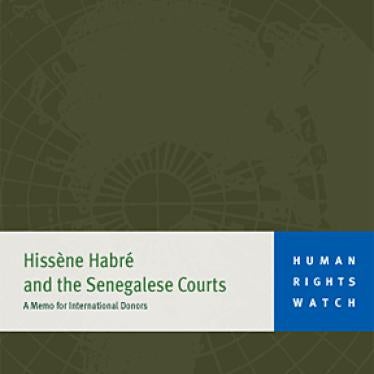(Dakar) - The African Union (AU) should press Senegal to extradite the former Chadian dictator Hissène Habré to Belgium, a coalition of his victims and human rights groups said today.
African heads of state will come together in Equatorial Guinea on June 30, 2011, for an AU summit meeting. Senegal, on May 30, withdrew from talks with the AU to establish a court in Dakar to try Habré.
"Time is up," said Jacqueline Moudeina of the Chadian Association for the Promotion and Defense of Human Rights (ATPDH). "We would have liked to see Habré tried in Africa, but after 20 years the important thing now is that justice be done somewhere."
In an unusually blunt report prepared for the summit, the AU Commission complained of Senegal's "marginal progress" in organizing Habré's trial and called on the summit to consider "options other than that of Senegal."
The former dictator is accused of thousands of political killings and systematic torture from 1982 to 1990, before he fled to Senegal, where he has remained for two decades. Belgium requested his extradition in 2005 and again in 2011.
"Habré's trial is the priority now. If Senegal has no intention of trying him, it has to send him to Belgium immediately," said Dobian Assingar of the International Federation of Human Rights, who is also honorary president of the Chadian League for Human Rights. "Senegal's refusal to try Habré is a blow to those who believe in Africa's capacity to bring to justice its own despots."
According to the AU Commission report, Senegal has yet to explain why it walked out of the talks in Dakar on May 30 about establishing the court.
The delegation's withdrawal followed more than a decade of stalling tactics by the government of President Abdoulaye Wade. In 2000, a senior Senegalese judge indicted Habré but, after political interference by Wade that was denounced by the United Nations, Senegalese courts said they had no jurisdiction to try the case.
The victims turned to Belgium, and a Belgian judge, after a four-year investigation, indicted Habré in 2005. After Senegal refused to extradite him, the AU called on Senegal in 2006 to prosecute Habré "on behalf of Africa." Senegal then spent four years wrangling over a trial budget before a November 2010 donors' meeting pledged US$ 11.7 million to provide the full trial costs.
Habré's one-party rule was marked by widespread atrocities, including waves of ethnic campaigns. Files of Habré's political police reveal the names of 1,208 people who were killed or died in detention. A total of 12,321 victims of human rights violations were mentioned in the files. A Chadian Truth Commission also found that Habré had virtually emptied out the Chadian treasury before his flight to Senegal.
In its report, the AU Commission pointedly noted that Senegal "has an obligation under the Convention against Torture of 1984 to prosecute Hissène Habré or extradite him." In 2006, the UN Committee against Torture condemned Senegal for violating this obligation and called on Senegal to bring Habré to justice.
The commission said that if Senegal did move forward with the prosecution, other options should be considered, including a trial in Chad before a special international court, and extradition to Belgium.
The groups asking the AU to press Senegal to extradite Habré are the Chadian Association for the Promotion and Defense of Human Rights (ATPDH), the Association of Victims of Hissène Habré (AVCRHH), the African Assembly for the Defense of Human Rights (RADDHO), the Senegalese League for Human Rights, Human Rights Watch, Agir Ensemble pour les droits de l'homme, and the International Federation of Human Rights (FIDH).
They said that the conditions for a fair trial did not exist in Chad and that after 21 years of waiting, they felt that Habré's extradition to Belgium was the most efficient, realistic, and timely option for ensuring that he would be able to respond to the charges against him with all the guarantees of a fair trial.
In July 2010, Archbishop Desmond Tutu and 117 groups from 25 African countries denounced the "interminable political and legal soap opera" to which the victims had been subjected over 20 years
In 2009, Belgium filed a lawsuit against Senegal at the International Court of Justice in The Hague to force Senegal either to prosecute Habré itself or to extradite him to Belgium. A ruling in that case is not expected until 2012.
Souleymane Guengueng, who nearly died of dengue fever during almost three years of mistreatment in Chadian prisons, spoke for the victims. He got out of jail when Habré fell in 1990 and founded an association of victims to seek justice.
"First we were tortured by Habré's dictatorship and now for 21 years we have been mocked by Senegalese and African leaders who refuse to hear our pleas for justice," Guengueng said. "Unless the AU acts decisively, there won't be any victims left at the trial."






